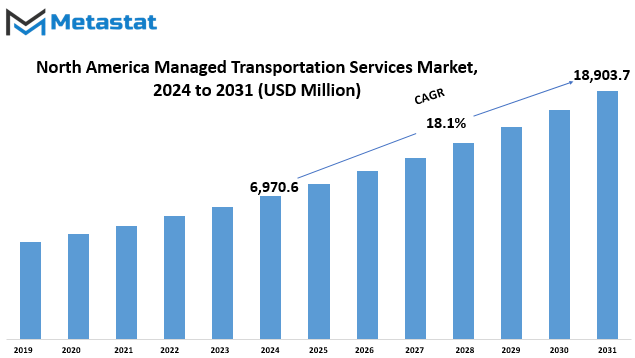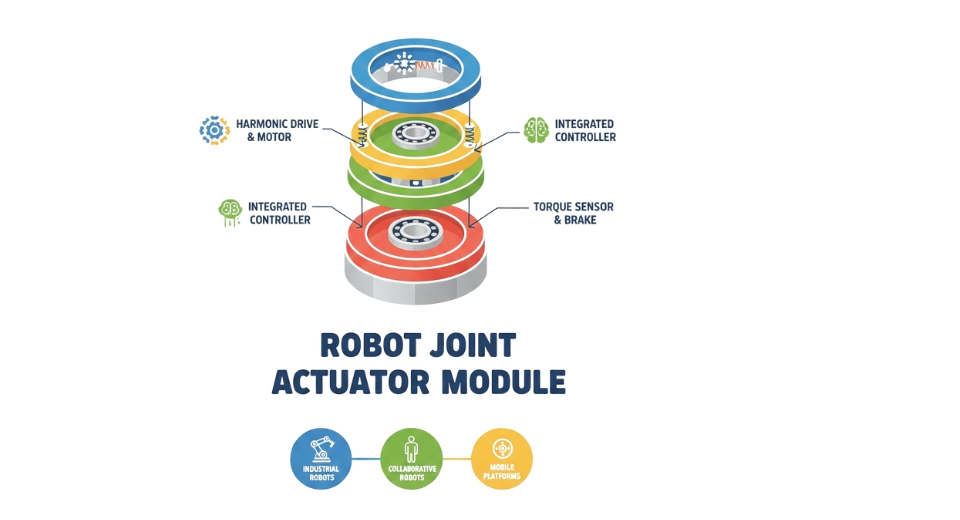MARKET OVERVIEW
The North America Managed Transportation Services market stands as an influential force within the broader logistics and transportation industry. At its core, this market encapsulates a spectrum of outsourced solutions designed to streamline and enhance the efficiency of freight and transportation management for businesses across the continent.
In logistics, where precision and timeliness are paramount, the North America Managed Transportation Services market emerges as a key player. This industry orchestrates a symphony of services encompassing freight optimization, carrier management, and real-time visibility. Businesses increasingly turn to these services to navigate the intricate web of supply chain challenges, entrusting their transportation needs to specialized experts.
As North America Managed Transportation Services market, it becomes evident that its significance lies in its ability to offer tailored solutions. Service providers in this sector go beyond mere transportation; they become strategic partners, aligning their operations with the unique demands of each client. Whether it’s route optimization, mode selection, or proactive issue resolution, the industry’s expertise is a linchpin in the seamless functioning of supply chains.
The North America Managed Transportation Services market thrives on adaptability, a characteristic inherent in its operations. In this ever-evolving landscape, service providers leverage cutting-edge technologies like artificial intelligence, predictive analytics, and IoT to anticipate challenges and optimize transportation routes. This technological integration not only enhances operational efficiency but also ensures a level of agility that is crucial in today’s fast-paced business environment.
Within the North America Managed Transportation Services market, businesses find a pivotal partner in navigating the complexities of regulatory compliance. As transportation regulations continue to evolve, service providers play a crucial role in ensuring that clients’ freight movements adhere to the latest standards. This regulatory acumen acts as a shield, protecting businesses from potential disruptions and legal pitfalls in their supply chain operations.
In essence, the North America Managed Transportation Services market embodies a symbiotic relationship between expertise and execution. Its impact extends beyond the transportation of goods, influencing inventory management, cost control, and overall supply chain resilience. As businesses grapple with the multifaceted challenges of the modern marketplace, industry stands as a beacon of reliability, providing a comprehensive suite of services to fortify the backbone of commerce.
The North America Managed Transportation Services market isn’t merely an industry; it’s an indispensable partner for businesses seeking efficiency, adaptability, and strategic alignment in their supply chain endeavors. As technology advances and the business landscape continues to evolve, the market’s role as a catalyst for seamless logistics solutions will undoubtedly remain at the forefront of the broader transportation industry.
North America Managed Transportation Services market is estimated to reach $18,903.7 Million by 2031; growing at a CAGR of 18.1% from 2024 to 2031.

GROWTH FACTORS
The North America Managed Transportation Services market showcases a dynamic landscape with various factors influencing its trajectory. One of the primary drivers propelling this market forward is the compelling Return on Investment (ROI) that businesses experience when opting for managed transportation services. Companies find a tangible and positive impact on their financials, making it a strategic choice.
Operational Efficiency stands as another significant driver in this market. With managed transportation services, businesses streamline their operations, ensuring a smoother and more efficient supply chain. This operational enhancement contributes to better overall performance, creating a favorable environment for sustained growth.
However, not without challenges, the market grapples with certain restraints. Operational Inefficiencies pose a notable hurdle, impacting the seamless flow of managed transportation services. This challenge requires a nuanced approach for resolution, acknowledging the intricacies within the operational framework.
Furthermore, the market faces stiff Competition from Transportation Management Systems (TMS). As businesses weigh their options, the allure of standalone TMS solutions poses a threat to the adoption of comprehensive managed transportation services. Navigating this competitive landscape demands a strategic outlook to carve a niche and provide value that transcends individual TMS offerings.
Amidst these challenges, there exists a promising Opportunity for market players. The Shift to Non Container Port Developments emerges as a potential avenue for growth. As businesses explore alternatives beyond traditional container ports, a new dimension unfolds for managed transportation services. Adapting to this shift requires a forward-looking mindset, aligning services with the evolving needs of a changing market landscape.
The North America Managed Transportation Services market is a realm where the pursuit of strong ROI and operational efficiency is met with challenges such as operational inefficiencies and competition from standalone TMS solutions. However, the opportunity lies in the strategic shift towards Non-Container Port Developments. Success in this market requires a delicate balance of addressing challenges while seizing opportunities, demonstrating the adaptability necessary for sustained growth. As businesses navigate this landscape, a focus on value creation and forward thinking strategies becomes paramount to establishing a resilient presence in the North America Managed Transportation Services sector.
MARKET SEGMENTATION
By Functionality
The North America Managed Transportation Services (MTS) market is divided based on functionality, which enhances its overall operational efficiency. This segmentation includes Planning & Optimization, Execution & Operations, and Visibility & Monitoring.
Planning & Optimization, a crucial facet of MTS functionality, involves strategically planning and streamlining transportation operations. This phase focuses on maximizing efficiency, reducing costs, and ensuring that resources are allocated effectively. By fine-tuning the planning process, companies can optimize their transportation networks, resulting in smoother operations.
Execution & Operations represent the hands-on, day-to-day management of transportation tasks. This functionality ensures that plans devised during the planning phase are executed seamlessly. From overseeing shipments to managing routes, Execution & Operations play a pivotal role in translating strategic plans into tangible actions.
Visibility & Monitoring is another vital component in the MTS spectrum. This functionality provides real-time insights into the transportation process. Companies can track shipments, monitor progress, and address issues promptly. Visibility & Monitoring contribute to a proactive approach, allowing businesses to adapt swiftly to unforeseen circumstances, ultimately enhancing overall supply chain efficiency.
The Planning & Optimization, Execution & Operations, and Visibility & Monitoring functionalities collectively empower businesses to navigate the intricate landscape of transportation services. By strategically integrating these components, companies can create a robust and responsive transportation framework that aligns with their operational goals.
The North America MTS market's segmentation based on functionality reflects a dynamic industry adapting to the evolving needs of businesses. Planning & Optimization, Execution & Operations, and Visibility & Monitoring are interlinked, each playing a distinct yet interconnected role in the transportation process. This segmentation acknowledges the multifaceted nature of managing transportation services and emphasizes the importance of a comprehensive approach.
The North America Managed Transportation Services market’s segmentation by functionality underscores the industry’s commitment to addressing the diverse needs of businesses. The integration of Planning & Optimization, Execution & Operations, and Visibility & Monitoring creates a synergistic system that goes beyond conventional transportation management. As businesses continue to prioritize efficiency and adaptability in their supply chain operations, the relevance of these functionalities in the MTS market is poised to grow, shaping a more responsive and resilient transportation landscape.

By Service Type
The North America Managed Transportation Services market is a dynamic landscape, shaped by various service types that cater to the intricate needs of businesses. These services, namely Managed Freight, Managed Fleet, and Managed Logistics, play a pivotal role in the transportation sector, each contributing to the overall market value.
In 2022, the Managed Freight segment stood strong with a valuation of 1469.1 USD Million. This service type revolves around efficiently handling and overseeing the transportation of goods, ensuring a smooth flow from point A to point B. It serves as a crucial pillar in the logistics chain, optimizing freight operations for businesses across the region.
Similarly, the Managed Fleet segment held a significant position, boasting a valuation of 1655.6 USD Million in the same year. This service entails the strategic management of fleets, encompassing everything from vehicle maintenance to route planning. By providing businesses with a comprehensive solution for their fleet-related needs, Managed Fleet services contribute to the efficiency and reliability of transportation systems.
Furthermore, the Managed Logistics segment emerged as a robust force, valued at 1894.6 USD Million in 2022. This service type encompasses a broader scope, overseeing the entire logistics process. From inventory management to order fulfillment, Managed Logistics ensures that businesses can streamline their operations, reducing bottlenecks and enhancing overall productivity.
The significance of these service types lies in their ability to address the diverse requirements of businesses operating in North America.Managed Freight, Managed Fleet, and Managed Logistics collectively form the backbone of the transportation services market, offering tailored solutions to organizations with varying logistical needs.
Businesses across the region have increasingly embraced Managed Transportation Services to navigate the complexities of supply chain management. The seamless integration of these services into daily operations has not only improved efficiency but has also allowed companies to focus on their core competencies while leaving the intricacies of transportation in capable hands.
As we reflect on the market trends, it becomes evident that the demand for Managed Transportation Services continues to grow. This can be attributed to the evolving landscape of business operations, where companies seek reliable partners to handle the intricacies of transportation, allowing them to stay competitive in a fast-paced environment.
The North America Managed Transportation Services market thrives on the synergy of its key service types Managed Freight, Managed Fleet, and Managed Logistics. Their individual contributions to the market underscore the essential role they play in supporting businesses across the region. As the market continues to evolve, these services are poised to remain indispensable, facilitating the seamless movement of goods and contributing to the overall success of businesses in North America.
By Mode of Transportation
The North America Managed Transportation Services market exhibits diverse facets, notably segmented by the mode of transportation—Roadways, Railways, Airways, and Waterways. Each mode plays a pivotal role in shaping the dynamics of this market.
Roadways, as a primary mode, contribute significantly to the transportation landscape. The extensive network of highways facilitates the movement of goods and services across vast distances. This mode proves instrumental in connecting urban and remote areas, fostering a seamless flow of commerce.
Railways, another integral facet, represent an efficient and sustainable mode of transportation. The rail network not only handles the bulk transportation of goods but also ensures reduced environmental impact compared to other modes. The reliability and cost effectiveness of railways make them a preferred choice for certain cargo types.
Airways, with their unparalleled speed, bring an element of swiftness to the transportation matrix. Particularly crucial for time-sensitive shipments, air transportation provides a rapid means to connect geographically distant locations. The globalized nature of commerce often demands the agility offered by air transport, making it a key player in the market.
Waterways, while sometimes underrated, play a crucial role in fostering international trade. Navigable rivers, canals, and coastal routes offer a cost-effective means for transporting goods on a large scale. Water transportation’s economic viability and its ability to handle bulk cargo contribute significantly to the overall efficiency of managed transportation services.
Examining the market further, the role of technology emerges as a defining factor. The integration of advanced technologies like GPS tracking, real-time monitoring, and data analytics has revolutionized the management of transportation services. These technological interventions enhance efficiency, minimize delays, and provide valuable insights into the supply chain.
Moreover, the market is witnessing a growing emphasis on sustainability. Stakeholders increasingly prioritize environmentally friendly practices, pushing for cleaner modes of transportation and reduced carbon footprints. This shift aligns with broader societal trends and regulatory initiatives, reflecting a conscientious approach to the ecological impact of transportation services.
Customer demands also shape the landscape of managed transportation services. With a rising expectation for transparency and real-time information, service providers are compelled to adopt customer-centric strategies. This includes streamlined communication channels, responsive customer support, and user-friendly interfaces for enhanced client experience.
Collaboration emerges as a key theme within the market. Partnerships between logistics companies, technology providers, and regulatory bodies contribute to a more integrated and efficient transportation ecosystem. Such collaborations facilitate knowledge exchange, innovation, and the development of comprehensive solutions that address the evolving needs of the market.
The North America Managed Transportation Services market, segmented by the mode of transportation, reflects a dynamic interplay of factors. From the foundational role of roadways to the swiftness of air transport, and the efficiency of railways and waterways, each mode contributes uniquely to the intricate tapestry of managed transportation services in the region. Technological advancements, sustainability considerations, customer expectations, and collaborative efforts further shape this vibrant landscape, underscoring the multifaceted nature of the industry.
REGIONAL ANALYSIS
In terms of geography, the North America Managed Transportation Services market is categorized into North America. This segmentation allows for a focused analysis of the market trends and dynamics specific to this region. It provides a localized perspective on the various factors influencing the Managed Transportation Services sector within North America.
The geographical breakdown aids in understanding the unique challenges and opportunities that businesses operating in North America of Managed Transportation Services. This approach facilitates a more targeted examination of the market, taking into account the distinct characteristics of the North American business landscape.
One significant advantage of this regional analysis is the ability to recognize and respond to the diverse needs of businesses across North America. The market conditions in different parts of the continent can vary, and this division allows for a nuanced exploration of those differences. Understanding the regional nuances is crucial for businesses seeking to navigate the complexities of the North America Managed Transportation Services market successfully.
Moreover, by focusing on North America, the analysis can capture the broader trends that transcend individual states or provinces. This broader view enables a comprehensive understanding of the overarching factors shaping the Managed Transportation Services market in the entire North American region.
Within this regional context, businesses can tailor their strategies to align with the specific demands and preferences of the North American market. Recognizing the regional variations ensures that companies can adapt their approaches to cater to the unique requirements of diverse consumer bases, contributing to their overall market competitiveness.
The North America Managed Transportation Services market's regional analysis, therefore, serves as a valuable tool for businesses aiming to thrive in the dynamic landscape of transportation services. It provides insights into the localized intricacies that can impact operational efficiency, customer satisfaction, and overall business success within the North American market.
The division of the North America Managed Transportation Services market based on geography allows for a comprehensive examination of the regional dynamics. This approach ensures that businesses can craft strategies that resonate with the diverse conditions and preferences across North America, contributing to their sustained growth and success in this sector.
COMPETITIVE PLAYERS
The North America Managed Transportation Services market is a dynamic landscape with several key players driving the industry forward. These companies play a crucial role in offering comprehensive transportation solutions, ensuring the smooth movement of goods across the region. Among the noteworthy participants in this sector are C.H. Robinson Worldwide, Inc., UPS Supply Chain Solutions, J.B. Hunt Transport Services, Inc., Ryder System, Inc., XPO Logistics, Inc., Penske Logistics, Echo North America Logistics, Inc, Coyote logistics llc, Landstar System, Expeditors International of Washington, Inc., Kuebix, and PLS Logistics.
C.H. Robinson Worldwide, Inc. stands as a prominent player, contributing significantly to the Managed Transportation Services sector. Their expertise lies in effectively managing and optimizing supply chains, offering tailored solutions to meet diverse client needs. This approach ensures a reliable and efficient transportation network.
UPS Supply Chain Solutions is another key player known for its extensive reach and capabilities in managing transportation services. With a focus on providing end-to-end solutions, they contribute to the seamless flow of goods, addressing the complex demands of the modern logistics landscape.
J.B. Hunt Transport Services, Inc. brings its own strengths to the table, specializing in various transportation modes. This versatility allows them to cater to a wide range of industries, adapting to the unique requirements of each. Their commitment to innovation and efficiency is a driving force in the competitive realm of managed transportation services.
Ryder System, Inc. is recognized for its integrated logistics solutions, offering a holistic approach to transportation management. By combining expertise in fleet management, dedicated transportation, and supply chain solutions, Ryder System, Inc. establishes itself as a reliable partner in the industry.
XPO Logistics, Inc. is a significant player, leveraging advanced technology to enhance transportation and supply chain operations. Their focus on digital solutions and data-driven insights contributes to the evolution of the Managed Transportation Services market.
Penske Logistics is known for its commitment to operational excellence. With a focus on continuous improvement, Penske Logistics ensures efficiency and reliability in transportation services, meeting the evolving needs of clients in North America.
Echo North America Logistics, Inc. is a player that stands out for its innovative approach. By incorporating technology and automation, they streamline transportation processes, offering a modern and efficient solution to the challenges faced in logistics.
Coyote logistics llc contributes to the competitive landscape with its emphasis on responsiveness and agility. In a market where adaptability is key, Coyote logistics llc's ability to swiftly respond to changing dynamics positions them as a valuable player in managed transportation services.
Landstar System is recognized for its unique business model, relying on a network of independent agents. This decentralized approach allows them to offer customized solutions, tailoring transportation services to the specific needs of diverse clients.
Expeditors International of Washington, Inc. brings its global perspective to the North America Managed Transportation Services market. With a focus on international logistics, they play a crucial role in facilitating cross-border movements, contributing to the overall efficiency of industry.
Kuebix is known for its cloud-based transportation management system. This technology-driven approach allows clients to optimize their transportation processes, gaining visibility and control over their supply chains in an increasingly interconnected market.
PLS Logistics is a key player, offering a range of logistics services to meet the demands of various industries. Their customer-centric approach and commitment to reliability contribute to their significance in the competitive landscape of managed transportation services in North America.
The North America Managed Transportation Services market is characterized by the presence of these diverse and influential players. Each contributes to the industry's growth and development through their unique strengths, strategies, and commitment to delivering effective transportation solutions. This competitive landscape ensures a dynamic and responsive sector, driving continuous improvements in managed transportation services across North America.
Managed Transportation Services Market Key Segments:
By Functionality
- Planning & Optimization
- Execution & Operations
- Visibility & Monitoring
By Service Type
- Managed Freight
- Managed Fleet
- Managed Logistics
By Mode of Transportation
- Roadways
- Railways
- Airways
- Waterways
Key North America Managed Transportation Services Industry Players
- UPS Supply Chain Solutions
- J.B. Hunt Transport Services, Inc.
- Ryder System, Inc.
- XPO Logistics, Inc.
- Penske Logistics
- Echo North America Logistics, Inc
- Coyote logistics llc
- Landstar System
- Expeditors International of Washington, Inc.
- Kuebix
- PLS Logistics
WHAT REPORT PROVIDES
- Full in-depth analysis of the parent Industry
- Important changes in market and its dynamics
- Segmentation details of the market
- Former, on-going, and projected market analysis in terms of volume and value • Assessment of niche industry developments
- Market share analysis
- Key strategies of major players
- Emerging segments and regional growth potential








 US: +1 3023308252
US: +1 3023308252






